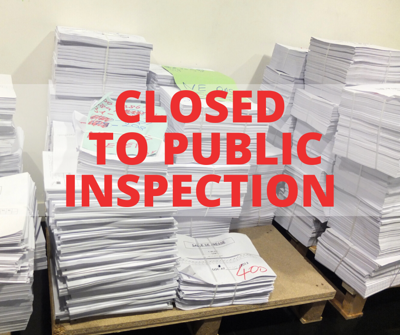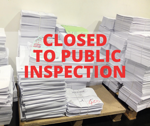Everybody knows it’s three strikes and you’re out in baseball. We need that same rule when it comes to state and local governments in South Carolina letting the public know how they’re conducting the public’s business.
Two years ago, S.C. Inspector General Brian Lamkin issued a mini-report card on how well state agencies were complying with a 2017 change to the state Freedom of Information Act that was supposed to make it tougher for agencies to violate the law, and require them to provide information more quickly without gouging people with inflated costs.
The bar was low — Mr. Larkin merely checked the agencies’ websites to see if their stated FOI policies complied with the new law. Astoundingly, not all did.
Strike one.
A year ago, Post and Courier reporter Avery Wilks reported that some government officials had realized that they could suppress critical news reporting — not to mention citizen-led inquiries — by simply charging exorbitant fees to release public records. The 2017 law was prompted by governments’ routine practice of slow-walking responses to document requests and fabricating reasons to withhold records. It was supposed to make it harder to violate the law and rein in ridiculous fees. It also allowed governments to charge a “reasonable fee” for redacting information from documents that state law allows them to hide.
The surge in exorbitant charges that Mr. Wilks discovered was all the more disturbing because there are only a few things that state law actually requires government to hide from the public; in most cases, it simply allows them to hide information. So public officials are choosing to hide information from the public, and then charging us for the effort it takes to keep the information hidden.
Strike two.
Now Mr. Wilks is back, with a report on a survey he and his colleague Adam Benson conducted of 26 state and local government agencies. The reporters sent FOI requests in January seeking information about their legal fees since Jan. 1, 2019. Pretty basic stuff, and under state law the agencies had 20 days to acknowledge the requests and then 35 more days to provide the documents.
The good news is that most complied. Leading the way was Gov. Henry McMaster, a longtime government transparency advocate who told our reporters: “Our goal of every government office … should be to inspire the confidence of the people. And when the people ask for information, they ought to get it.”
The bad, and unfortunately unsurprising, news is that several failed this basic test of compliance with the law.
Strike three.
The tiny Richland County town of Eastover and the huge Richland County Sheriff’s Department didn’t even acknowledge the requests, as state law clearly requires them to do. USC acknowledged its FOI request but didn’t provide the requested information until nearly seven weeks after the legal deadline. USC and the Richland County government still haven’t managed to post their FOI fees on their websites. And then there was Richland County School District One, which demanded $1,876 to redact the information about how it was spending tax money that the district decided was just none of the public’s business.
We’d love to believe that the responses would be different in the Lowcountry, but attention to good-government requirements tends to be highest around state capitals, and we have no reason to think it would be.
Now, whether Eastover complies with open-government requirements isn’t much of a concern for people who don’t live there, but the fact that there’s no real recourse is a concern. A sort of citizens’ enforcement provision — to make it easier and cheaper for members of the public to challenge noncompliance — was stripped from the 2017 bill at the last minute.
We're sure there have been some marginal improvements as a result of the 2017 revisions to South Carolina's open government law. But the problem before 2017 was that the Legislature didn't require government agencies to provide enough information to the public about how public officials conduct the public's business, and didn't provide a good way to enforce what openness was required.
The result was that agencies that believed in serving the public instead of themselves complied with the law, and those that had other priorities did not. Four years, three general reviews and countless individual violations later, those problems remain.
Yes, it would be great for the Legislature to close some of the loopholes in the law, but we'd be exponentially better able to judge what our government was doing — and that would force our government to do a better job — if lawmakers would simply provide some real penalties for agencies that violate the law, and a realistic enforcement mechanism. It's past time to fix this problem.

















